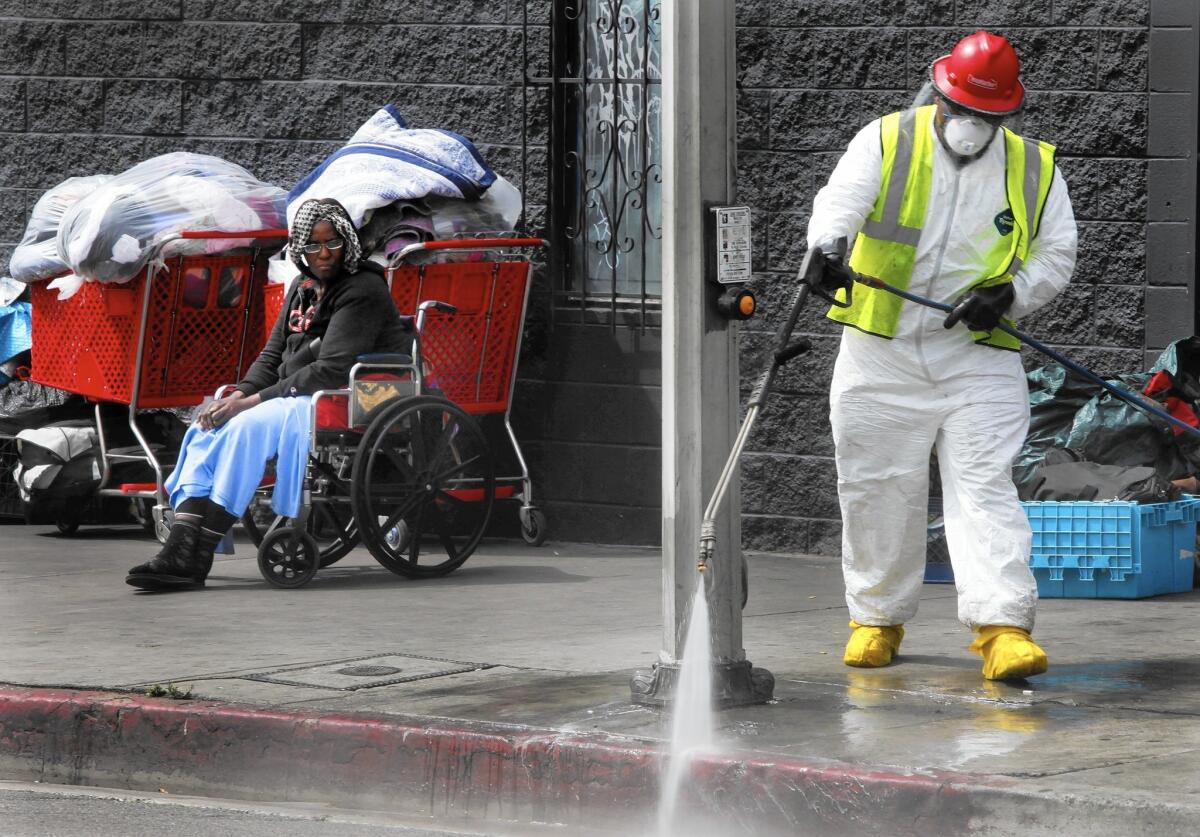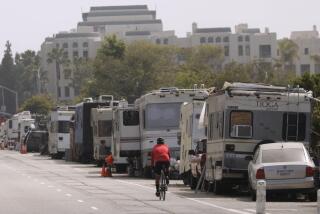L.A. may take a new tack against personal items left on sidewalks

Los Angeles officials are taking a new run at the politically sensitive issue of clearing sidewalks of personal possessions left unattended by the homeless, without running afoul of court rulings.
A proposed ordinance making its way to the full City Council is the latest in a series of attempts to address a rising outcry tied to an entrenched homeless population.
The measure is gaining traction amid growing complaints from neighborhoods far from downtown’s skid row about new encampments on sidewalks, in alleys behind homes and in flood control channels. And it follows an internal City Hall report that warned garbage-strewn streets are damaging L.A.’s image nationally.
Previous council-approved legal restrictions on leaving property on sidewalks, sleeping on the streets and living in vehicles have been struck down by federal judges.
City officials, concerned about recent accumulations of trash and personal belongings at encampments in Venice, downtown and elsewhere, are trying a new legal approach to enforcement that would, among other things, sharply reduce the warning period before personal items can be gathered up.
“We’ve gotten notice that some sidewalks are impassable,’’ said Councilman Mike Bonin, who represents the Venice area. “That violates parts of the Americans with Disabilities Act. This is about fine-tuning our legal tools and giving more helpful guidance to the city departments.”
Blair Besten, executive director of downtown’s Historic Core Business Improvement District, said the problem is especially acute in skid row, where the sidewalks on several streets are obstructed by tents, shopping carts and mounds of trash bags.
“This is an epidemic right now,’’ Besten told council members at a recent hearing. “I know you see this happening in your districts. I know you see the accumulation. What’s happening in skid row would never be allowed anywhere else. It just wouldn’t.”
Under the proposed ordinance, sanitation workers would be permitted to “bag and tag” personal items after giving 24 hours notice. That is significantly shorter than the 72-hours notice sanitation workers now provide under a protocol adopted after recent court decisions. The items would be held for 90 days, and then destroyed if unclaimed.
Updated language in the proposed law defines personal property as tents, tarps, sleeping bags, clothing, personal documents, medications and other materials.
City Atty. Mike Feuer, whose office drafted the ordinance, said it would apply citywide and to anyone who leaves property on sidewalks, not just the homeless. The measure “attempts to achieve the difficult balance between the legitimate quality of life goals of our neighborhoods and the rights and needs of people who are homeless,’’ Feuer said in a statement.
A public hearing on the issue is set for 2:30 p.m. Wednesday before the City Council’s Public Works and Gang Reduction Committee in Room 1060 at City Hall.
Carol Sobel, the Santa Monica attorney who has represented homeless defendants in previous lawsuits, did not return calls requesting comment.
The Rev. Andy Bales, chief executive of the Union Rescue Mission, one of skid row’s busiest shelters, said the proposed ordinance is a hot topic among social service providers. Confusion about what’s allowed to remain on the streets has led to a proliferation of homeless encampments, he said.
“We used to have a pretty good agreement that tents would be up between 9 p.m. and 6 a.m.,’’ Bales said. “Now tents are up all day and it’s hard for residents of the missions and residents of local housing to safely walk on the sidewalks.”
The city offers free storage bins for homeless people in downtown Los Angeles and Venice. Several operations to deep-clean streets in downtown and Venice were initiated last year after county officials cited the city for health and hygiene issues.
Skid row social service agencies say the underlying issue is inadequate housing to get the homeless off the streets. Mayor Eric Garcetti recently announced the city has secured nearly $13 million in federal funding to create additional housing for homeless veterans. He has promised to get every homeless veteran off the streets by year’s end.
More to Read
Sign up for Essential California
The most important California stories and recommendations in your inbox every morning.
You may occasionally receive promotional content from the Los Angeles Times.











